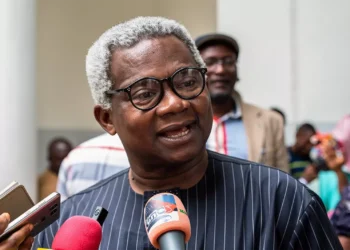Kaduna State Government on Friday has debunked claims that some money was paid to bandits for them to surrender their arms, clarifying that the state government has been working tirelessly to engage stakeholders and build trust among the various communities in the state.
Additionally, the government rejected the idea of engaging in any kind of discussion or compromise with some bandits who had changed their ways.
In an exclusive interview, Governor Uba Sani revealed this, one day after the state’s government received several bandits who surrendered.
“We did not give them one naira,” the governor said when asked if the state government made a financial bargain for the bandits to lay down their arms.
“There was no monetary issue at all. Most of them are tired; we sat down with them and asked them, ‘Why do you continue to remain in the bush just attacking our people, kidnapping them?”
The livestock market, which had been closed for about ten years due to the instability in the area, was reopened on Thursday after the state authorities received the first group of repentant bandits in Birnin-Gwari.
The development represents a significant turning point in the state government’s attempts to resolve the long-standing security issues in the state.
The governor was questioned during the performance about whether his administration pardoned the bandits for their past crimes, which he refused to answer. Governor Sani noted that it took his administration six months to broker peace with the bandits.
“It is a process that took almost six months precisely to reach this position. Birnin Gwari is one of the most critical local governments in terms of banditry, kidnapping, and insurgency in the North-West.
“We also partner with the federal security agencies and the office of the National Security Adviser. So, it’s a collective effort,” Sani added.
According to the governor, the disarmament, mobilization, and integration of the repentant bandits are in process.
The Kaduna State Government has been putting forth a lot of effort to include stakeholders and foster trust between the many communities in the state.
Since the Boko Haram group first appeared in the Lake Chad region in northeastern Nigeria in 2009, the country has been beset by armed conflict.
Despite a military campaign, several factions have broken away from or risen alongside the terror group, which is well-known for a number of mass abductions of schoolgirls.
Along with occasionally violent clashes between farming villages and nomadic herdsmen, the region has also been engulfed in disorder by armed bandits and kidnapping groups.
According to UN agencies, 33 million people may experience “acute food insecurity” by the end of the year because of the famine that has been exacerbated by the turmoil that has moved to northwest Nigeria.




































